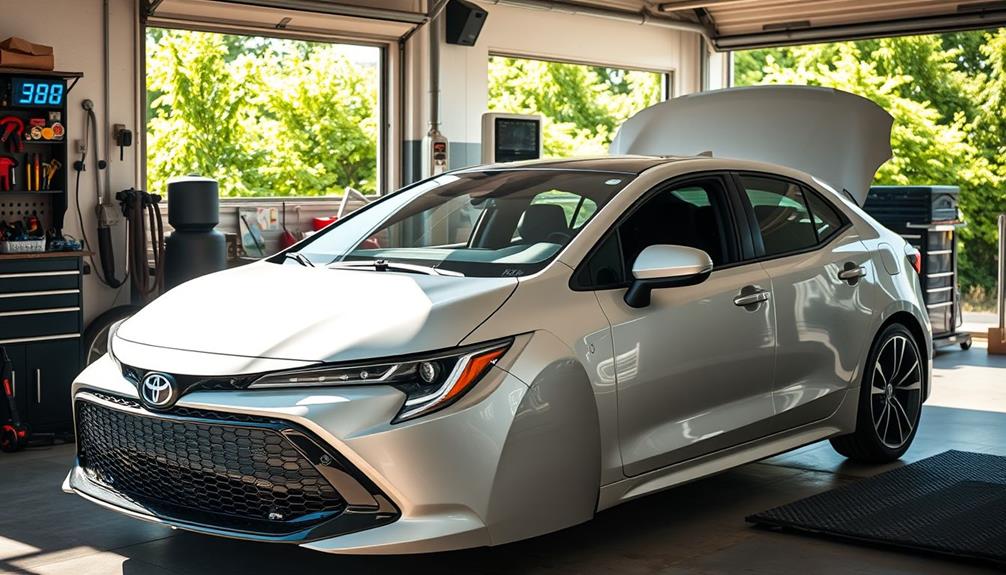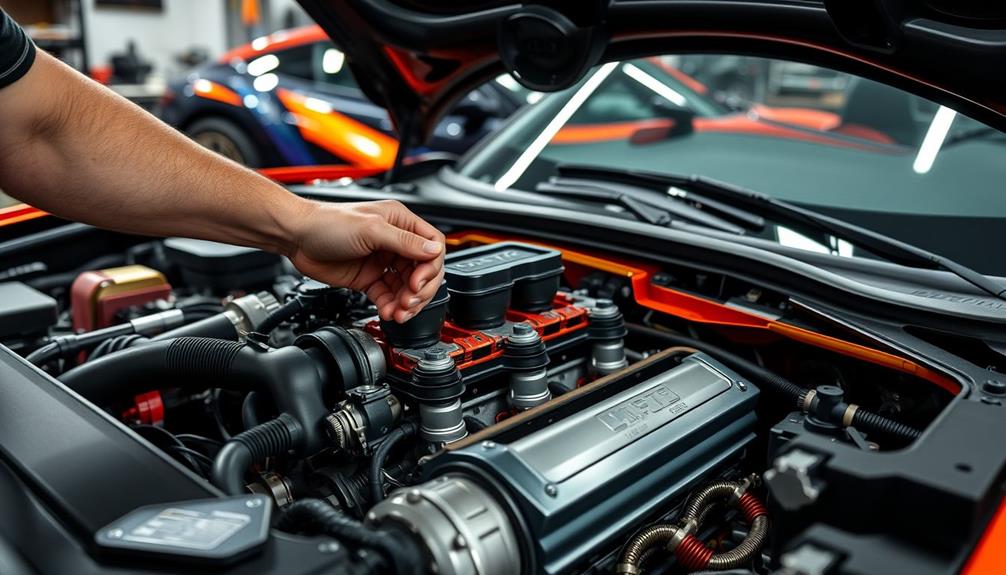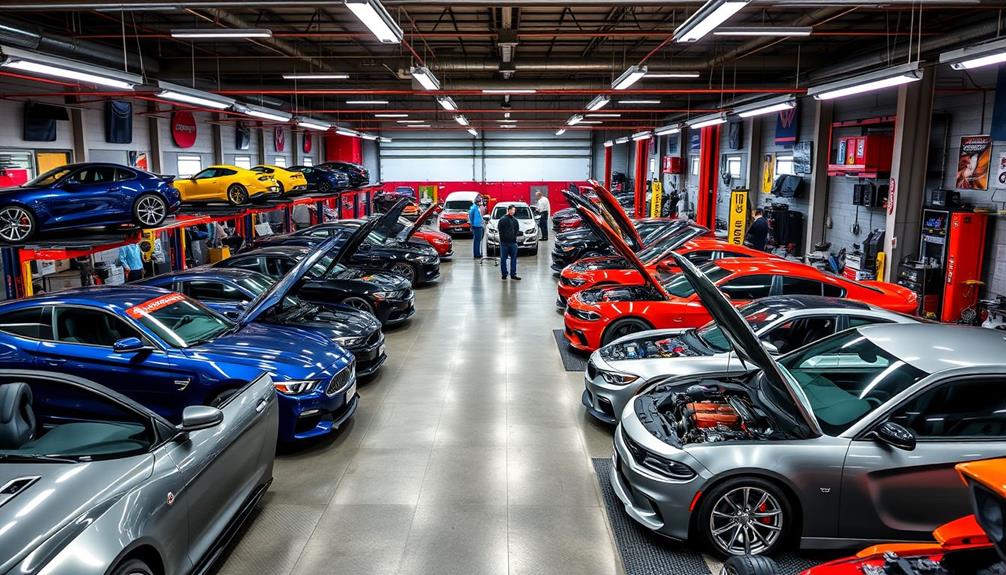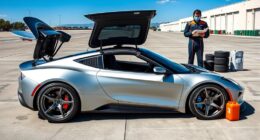Car tuning can definitely enhance your vehicle's performance, but it often risks voiding your warranty. Modifications, especially ECU tuning, may lead manufacturers to deny warranty claims if they link the changes to any vehicle issues. It's essential to know your manufacturer's guidelines and keep thorough documentation of all modifications. Safety-related upgrades like OEM parts usually maintain warranty coverage, while others can jeopardize it. Balancing your desire for performance with warranty protection is key. Keep exploring to uncover more detailed strategies on how to safely navigate these challenges. Car tuning and insurance implications should also be carefully considered. Some insurance companies may increase premiums or deny coverage for vehicles with certain modifications. It’s important to inform your insurance provider about any tuning or modifications to your vehicle to ensure you are adequately covered. Additionally, certain performance-enhancing modifications may increase the risk of accidents, which could impact your insurance coverage. It’s crucial to weigh the potential benefits of car tuning against the potential drawbacks in terms of warranty and insurance implications.
Key Takeaways
- ECU tuning can void warranty on powertrain and emissions systems if linked to vehicle failures.
- Modifications must align with manufacturer guidelines to protect warranty coverage.
- OEM performance parts usually maintain warranty, while aftermarket changes may risk it.
- Insurers must be informed about modifications to ensure coverage and avoid denied claims.
- Detailed documentation of all modifications is essential for warranty claims and insurance purposes.
Understanding Warranty Implications
When it comes to tuning your vehicle, understanding warranty implications is essential. Modifying your car, especially through ECU tuning, can impact your warranty coverage considerably. If you decide to make changes, be aware that certain modifications—particularly those related to the powertrain and emissions systems—can void your warranty on those components.
The Magnuson-Moss Warranty Act allows for non-dealer maintenance, but it won't protect you if a modification directly leads to a failure. You should also know that even if a car issue seems unrelated to your tuning, if the manufacturer can demonstrate that your modifications contributed to the problem, they can deny your warranty claim.
To navigate this tricky terrain, it's important to familiarize yourself with the manufacturer's guidelines for tuning. Some manufacturers provide specific instructions on how to modify your car without jeopardizing your warranty.
Additionally, keep thorough documentation of all modifications you make. This record will be essential if you ever need to prove that your ECU tuning didn't cause a vehicle issue. Understanding these factors will help you make informed decisions about tuning while protecting your warranty.
Navigating Insurance Considerations
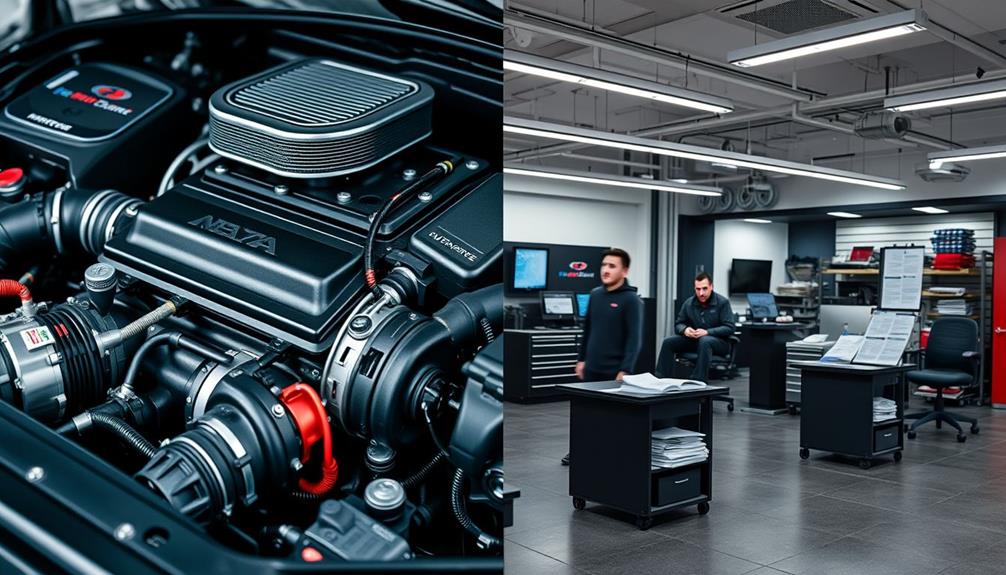
When you tune your car, you might see a bump in your insurance premiums due to the higher risk associated with modifications.
It's essential to keep your insurer in the loop about any changes, as failing to do so could leave you without coverage if something goes wrong.
Exploring specialized insurance options can help you find better rates and policies tailored for modified vehicles.
Insurance Premium Adjustments
Maneuvering insurance considerations after car tuning can be tricky, as modifications often lead to increased premiums. When you modify your vehicle, insurers see heightened risks tied to performance and potential accidents or theft. This can markedly impact your insurance premiums. Here's a quick overview of how tuning affects your coverage:
| Modification Type | Potential Impact on Premiums | Notes |
|---|---|---|
| Engine Tune | High | Increases performance-related risks. |
| Suspension Upgrade | Medium | May lead to higher accident risk. |
| Exhaust System Change | Medium | Can affect noise regulations. |
| Cosmetic Modifications | Low | Typically minimal impact. |
| Custom Wheels | Medium | May increase theft risk. |
It's essential to inform your insurance provider about any performance modifications. Failing to do so could result in denied warranty claims if you experience an accident. Some insurers may even require a post-modification inspection to adjust your coverage. Since the impact on insurance premiums varies widely between providers, you should compare options and look for policies that cater to modified vehicles.
Informing Your Insurer
Modifications to your vehicle can greatly affect your insurance coverage, so it's crucial to keep your insurer informed about any tuning changes. When you decide to get an ECU tune or other performance enhancements, your insurance premiums may increase due to the perceived risk associated with these modifications.
If you don't inform your insurance provider, you might face denied claims or even policy cancellations if an accident occurs.
It's also significant to review your policy terms carefully, as some insurers have specific clauses regarding performance modifications. Keeping detailed records of all changes helps clarify your vehicle's status and can protect your warranty and insurance.
Communicating openly with your insurer can guarantee that you maintain proper coverage and avoid any issues when filing a claim.
In some cases, specialized insurance companies offer tailored policies for modified cars, which can provide better coverage options suited to your needs as a car enthusiast.
Specialized Coverage Options
Steering through the world of specialized coverage options for modified vehicles can be complex, but it's vital for protecting your investment. If you're considering tuning your car, keep these key points in mind:
- Increased Insurance Premiums: Performance modifications often lead to higher premiums due to the perceived risks.
- Inform Your Insurer: Always notify your insurance provider about modifications; failing to do so could void your warranty and lead to denied claims.
- Tailored Policies: Seek specialized insurance providers that offer policies designed for modified vehicles, guaranteeing your coverage matches the unique risks associated with tuning.
- Documentation and Inspections: Be prepared to submit documentation of your modifications, as some insurers may require inspections to determine coverage eligibility.
Navigating these specialized coverage options is essential. Not only does it help you avoid voiding your warranty, but it also guarantees you have the right protection in case of accidents or theft.
Safe Performance Modifications

When enhancing your vehicle's performance, it's crucial to choose safe modifications that won't jeopardize your warranty. Safe performance modifications typically include OEM performance parts, which are designed to be compatible with your vehicle's specifications. These parts generally won't void your factory warranty, giving you peace of mind as you upgrade.
Additionally, it's advantageous to reflect on the long-term impact of these modifications on your overall budget and financial health, as improper choices may lead to unexpected costs or decreased vehicle value. Understanding common financial terms can help you make informed decisions.
Upgrading suspension components, like shocks and struts, can markedly enhance handling without compromising warranty coverage, as long as you avoid cutting or welding any factory parts.
Another popular option is installing a cat-back exhaust system, which usually doesn't affect your vehicle's emissions system, helping to maintain warranty integrity.
If you're pondering exterior modifications, such as lighting upgrades or cosmetic enhancements, you can typically proceed without worry, provided these don't interfere with your vehicle's mechanical systems.
ECU Tuning Risks
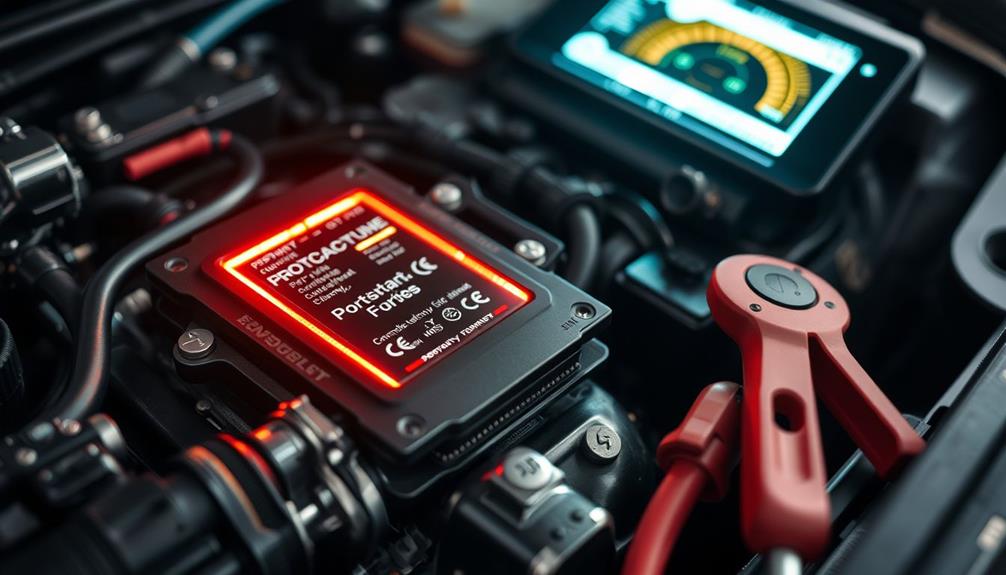
When you consider ECU tuning, you need to be aware of how it can impact your warranty coverage.
Many manufacturers can easily detect tuning changes with advanced diagnostic tools, putting your claims at risk.
If you decide to modify your ECU, make sure you understand the potential consequences before proceeding.
Warranty Coverage Impact
Tuning your vehicle's ECU can considerably enhance performance, but it also carries the risk of voiding your manufacturer's warranty. Before you engage in modifications, it's vital to understand the potential pitfalls.
Here are four key points to reflect on:
- Direct Impact: If your tuning is linked to a failure in the engine or powertrain, your warranty could be voided.
- Manufacturer Guidelines: Many manufacturers have specific rules about aftermarket ECU modifications. Not following these can lead to warranty denial.
- Broader Implications: Warranty claims might be denied not just for powertrain issues, but also for other components if they're tied to the tuning.
- Documentation: Keeping accurate records of any modifications, including ECU tuning, is essential for warranty claims.
Detection Methods Used
Many vehicle owners underestimate how easily dealers can detect ECU tuning modifications. Dealers use advanced diagnostic tools that access your engine control unit data and logs, making it simple to spot any performance tweaks you've made.
During routine services or repairs, these ECU scans can reveal changes like power gains or altered rev limiters, which mightn't seem significant to you but can raise red flags for technicians.
Technicians are trained to recognize signs of ECU tuning, and if they discover modifications, they'll likely flag the warranty status of your entire vehicle. This means that even if a repair is unrelated to the tuning, your warranty could still be voided.
Documentation practices also play a role; detailed service records often include notes about tuning, exposing your modifications even further.
In short, these detection methods are robust, and any tuning you've done can lead to serious consequences. It's crucial to weigh the risks carefully before making any modifications, as they could ultimately void your warranty and leave you with hefty repair bills down the line.
Exterior and Cosmetic Enhancements
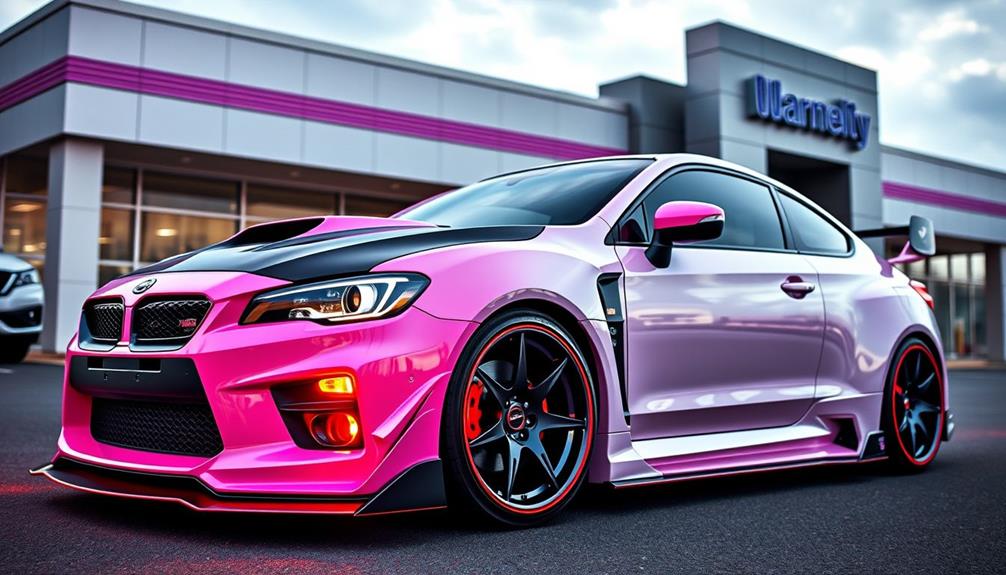
Car enthusiasts often seek exterior and cosmetic enhancements to personalize their vehicles and boost aesthetics.
These modifications can be a great way to express your style, and the good news is that most won't affect your vehicle's warranty. In a similar way to how diversification of retirement portfolios is crucial in volatile markets, these enhancements can add value and enjoyment to your vehicle without compromising warranty protections.
Here are four popular enhancements that typically keep you in the warranty good graces:
- Lighting Upgrades: Swapping out headlights or taillights for compliant, high-quality options is usually safe.
- Body Kits: Adding a body kit can enhance your car's look without interfering with mechanical systems.
- Grille Swaps: Changing the grille can greatly improve aesthetics without risking warranty coverage.
- Aerodynamic Enhancements: Features like front air diffusers and rear spoilers not only look good but can also enhance performance.
Before diving into these exterior and cosmetic enhancements, it's important to consult your vehicle's warranty terms.
This way, you can verify compliance and avoid any potential warranty issues. In general, as long as these modifications don't interfere with mechanical systems, your vehicle's warranty should remain intact.
Exhaust System Alterations
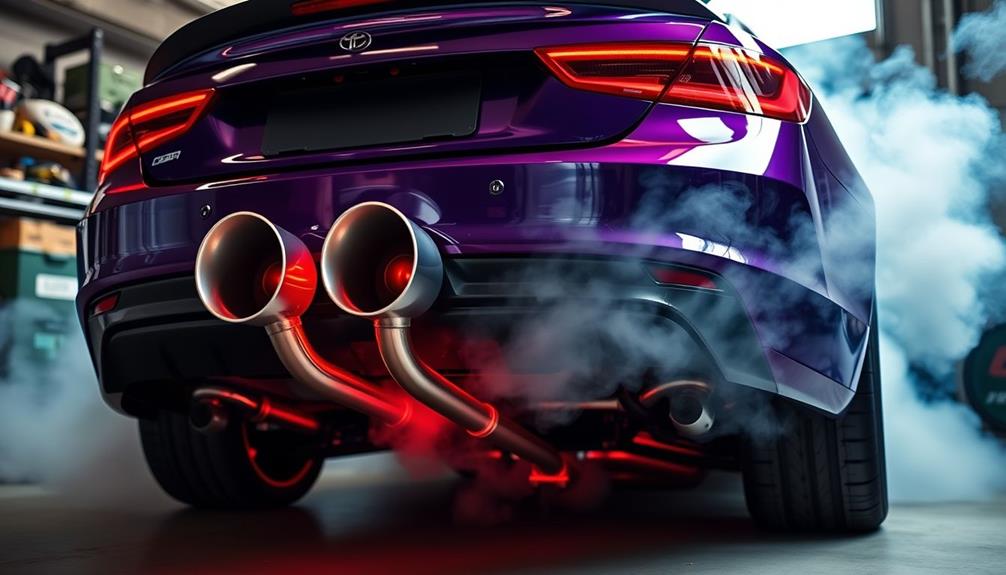
Modifying your exhaust system can considerably enhance your vehicle's performance and sound, but it comes with important considerations regarding warranty coverage. The moment you alter any emissions-related components, particularly the catalytic converter or oxygen sensors, you risk voiding your car warranty. This means that any future claims related to these parts might be denied, leaving you responsible for costly repairs.
While some modifications, like cat-back exhaust systems, are generally safer regarding warranty compliance, you still need to tread carefully. These systems extend from the catalytic converter to the rear and typically don't interfere with emissions regulation. However, if you're looking to boost horsepower and torque, be mindful that not all modifications are created equal.
Before making any changes, thoroughly review your warranty conditions to guarantee your planned alterations comply with the guidelines.
Aftermarket exhaust tips can be a great way to enhance your vehicle's aesthetic and sound without affecting the warranty, as long as they don't interfere with the mechanical systems. Always prioritize clarity on the implications of your modifications to enjoy the benefits without the risks.
Suspension and Handling Upgrades

Enhancing your vehicle's suspension and handling can greatly improve your driving experience, but it's crucial to navigate warranty implications carefully. Here are some key considerations:
- Aftermarket Components: Suspension upgrades like aftermarket shocks and lowering springs can boost performance but may void your warranty if they involve cutting or welding factory parts.
- Avoid Major Alterations: Utilizing existing fittings and making minor adjustments helps maintain warranty coverage, so avoid significant alterations to your vehicle's frame.
- Dynamic Enhancements: Upgrades such as sway bars and strut braces enhance vehicle dynamics and are generally safer for warranty coverage, provided they don't interfere with original specifications.
- Tire and Rim Compatibility: Larger rims and lower-profile tires improve grip, but assess their compatibility with factory settings to avoid potential warranty issues.
To protect your warranty, keep detailed records of all suspension upgrades and consult your warranty terms beforehand.
By being informed and cautious, you can enjoy improved handling while minimizing risks to your warranty coverage.
Always remember: thorough documentation and adherence to guidelines are your best allies in this tuning journey.
Balancing Performance and Warranty
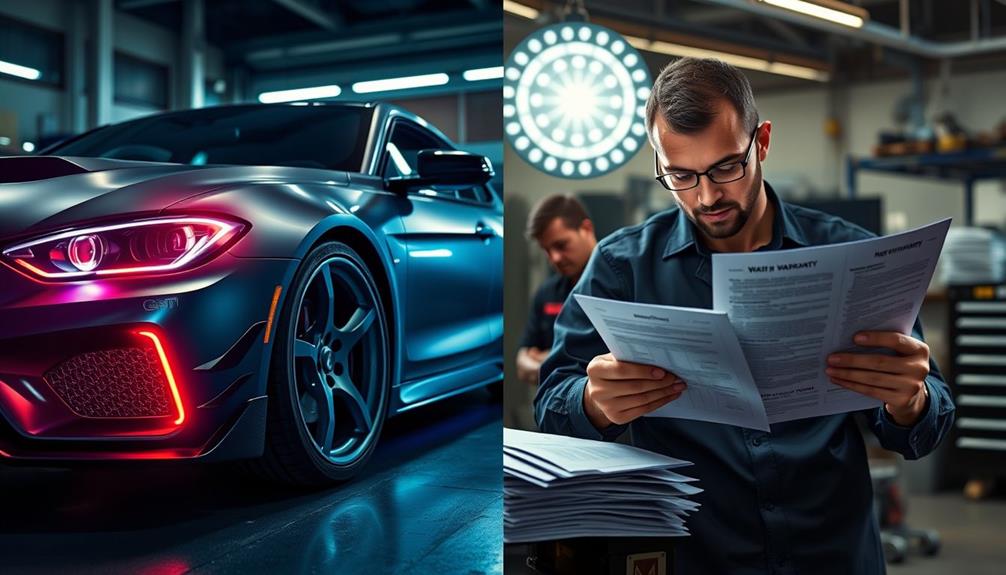
Steering through the delicate balance between performance upgrades and warranty protection can be a challenging task for vehicle owners. When you consider engine tuning or other modifications, you need to be aware that these changes might affect your factory and extended warranty.
If a performance modification is deemed to have caused a vehicle failure, especially in powertrain components, your warranty may be denied.
While some extended warranty options might cover specific modifications, they often exclude breakdowns resulting from performance tuning. This means you should thoroughly review the terms and conditions before making any upgrades.
OEM performance parts generally maintain warranty coverage, but aggressive aftermarket tuning can put you at risk.
It's essential for you to weigh the performance gains against the potential for warranty voidance. Some enhancements may not impact warranty claims if they're unrelated to the failure.
Consulting reputable tuners and keeping detailed records of all modifications can further help mitigate risks. This documentation can support warranty claims in case of disputes, allowing you to enjoy the thrill of tuning while keeping your warranty in mind.
Frequently Asked Questions
Does Tuning Your Car Void Your Warranty?
Tuning your car can potentially void your warranty. If modifications lead to failures, manufacturers often deny coverage. It's essential to understand your manufacturer's policies and document evidence proving tuning didn't cause any defects.
Does Automatic Tuning Void Warranty?
Over 60% of vehicle manufacturers state that modifications like automatic tuning can void warranties. If you're considering tuning, check your manufacturer's guidelines first; it could save you from costly repair denials down the line.
Will a Tuning Box Void the Warranty?
Installing a tuning box might void your warranty, especially if it causes engine issues. It's vital to review your warranty documentation, as manufacturers have different policies. A reputable box could help mitigate some risks.
Does Dyno Tuning Void the Warranty?
Could dyno tuning really affect your warranty? Yes, it can. If modifications lead to engine issues, manufacturers might deny your claim. Always document your tuning to protect yourself during potential warranty disputes down the line.
Conclusion
In the world of car tuning, remember, "you can't have your cake and eat it too." While enhancing your vehicle's performance can be thrilling, it's essential to weigh the risks against the rewards. Tuning can void warranties and complicate insurance claims, so always check your policies first. By choosing safe modifications and understanding the implications, you can enjoy a customized ride without sacrificing your peace of mind. Stay informed, and drive smart!

